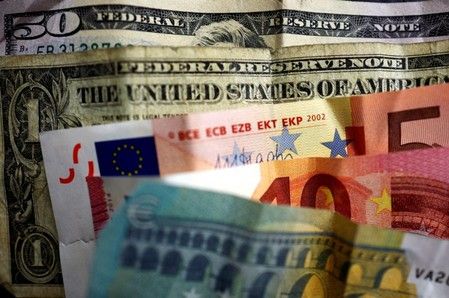By Francesco Guarascio
BRUSSELS (Reuters) – The euro zone could have an instant payments system shared by all banks in the bloc by the end of 2020, finance industry officials said, as lenders face more competition from the likes of Facebook and other tech firms.
Real-time payments have been possible in the 19-country currency bloc since 2017, but only about half of the euro zone’s banks have joined the scheme that underpins these transactions and it is mostly used for domestic payments.
The project could now accelerate as banks feel the heat of new competitors like Facebook, which last week unveiled plans for a cryptocurrency that would offer seamless payments to its users worldwide.
“The clock is ticking,” said Etienne Goosse, director general of the European Payments Council (EPC), that brings together large European banks, including Spain’s Santander, Deutsche Bank and France’s Societe Generale.
Goosse said that regardless of Facebook’s success with its move into payments, big technology firms were here to stay and banks needed to move more quickly.
He said the big tech firms had the advantage of being global unlike the fragmented European banking industry.
“They come with a global solution, under a global brand offering many things that the consumers seem to find wonderful,” Goosse said when asked about the impact of Facebook’s plans for crypto currency Libra.
“So we have no time.”
The EPC standard for instant payments has so far been adopted by some 60% of lenders and payment services providers in the euro zone, Goosse said, adding that it could be spread to all banks in the bloc by the end of 2020.
Without full coverage, some bank customers could experience transaction failures if transfers involve banks outside the system, which would reduce trust in the new service, another EPC official said.
Instant payments allow transactions between individuals and businesses to complete in a matter of seconds. Traditional transfers take at least one day before the payment is credited.
CLEARING HURDLE
Other industry officials confirmed that 2020 was a credible target. But for the system to work across borders existing clearing and settlement mechanisms should cover the whole euro zone. These mechanisms make sure money is correctly transferred between parties.
Several private clearing houses use the EPC standard for instant payments like EBA Clearing, which brings together Europe’s largest banks, or national counterparties like Spain’s Iberpay or Italy’s Nexi.
The European Central Bank in November launched its own settlement system for real-time transactions, known as TIPS, which stands for Target Instant Payment Settlement.
But each of these different systems cover only a few dozen banks, making instant payments often impossible among lenders that are not members of the same clearing houses.
“The challenge now is to make these mechanisms interoperable,” said Piet Mallekoote, the CEO of the Dutch Payment Association. The Netherlands has already made instant payments available to all bank customers in the country via a project backed by seven major domestic banks, including ING and ABN AMRO.
But even if a payments system is rolled out across the euro zone this may not be enough to attract customers away from fintech providers with easy to use apps.
Facebook can already tap into its established social media and chat services, but banks would need to agree on applications like mobile payments or use customers’ existing payment cards to convince them to use banks’ instant payment services.
(Reporting by Francesco Guarascio. Editing by Jane Merriman)














